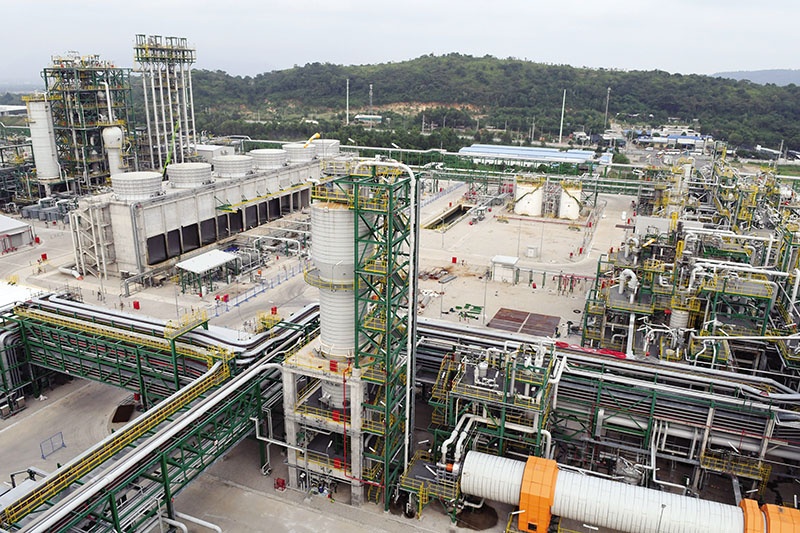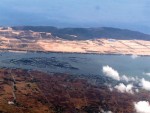More oil refineries required in Vietnam
Vietnam is home to the Dung Quat Oil Refinery, the Nghi Son Refinery and Petrochemical Complex, and condensate processing plants with a total capacity of 14 million tonnes of petroleum per year.
According to the Ministry of Industry and Trade (MoIT), this volume only meets around 70 per cent of current domestic demand, with the rest being imported through key petroleum traders.
State-owned Vietnam Oil and Gas Group (PetroVietnam) has proposed adjusting the investment policy of the Dung Quat Oil Refinery to allow for 7.5 million tonnes per year, while the Nghi Son Refinery and Petrochemical Complex has not yet established an investment plan for capacity expansion.
 |
| Dung Quat Oil Refinery plans expansion to bolster production capacity |
According to the MoIT, it is estimated that by 2045, Vietnam will lack about 12 million tonnes of petroleum and 3.5 million tonnes of petrochemical products per year.
This shortage is even larger according to PetroVietnam's calculations, reaching nearly 12 million tonnes of petroleum in 2025 and increasing to nearly 20 million tonnes by 2030.
PetroVietnam has therefore proposed crafting a project to build a refinery and petrochemical complex in the southern province of Ba Ria-Vung Tau.
Accordingly, in phase I the complex is set to turn out 12-13 million tonnes of crude oil and 660,000 tonnes of condensate, LPG, and Ethane per year. The plant’s output will be 7-9 million tonnes of petroleum and 2-3 million tonnes of petrochemicals per year.
| The MoIT has also requested the government to direct PetroVietnam to continue studying the project, complemented by inputs from relevant ministries and sectors. |
Following supplemental investment in phase II, the project aims to raise the output by an additional 3-5 million tonnes of petroleum and 5.5-7.5 million tonnes of petrochemical products per year.
According to PetroVietnam, the project’s investment scale in phase I will be $12.5-13.5 billion and a further $4.5-4.8 billion in phase II.
The MoIT believes that in the face of complex global developments, the eminent risk of energy supply disruptions, and rising energy prices, it is important to ensure energy security, including petroleum supply, so boosting the national reserve of crude oil and gasoline is imperative.
The MoIT has also requested the government to direct PetroVietnam to continue studying the project, complemented by inputs from relevant ministries and sectors.
Since the national crude oil refinery and petrochemical complex projects need more time to prepare for the investment process, at this time, the country is primarily looking to the Dung Quat Oil Refinery’s upgrade and expansion project to bolster its petroleum production capacity.
Reporting to the government's delegation on January 1, Binh Son Refining and Petrochemical JSC (BSR) – the management unit of Dung Quat Oil Refinery – said that the refinery has had a total investment value approximating $3 billion and an annual capacity of 6.5 million tonnes since coming into operation in 2010.
In recent months, amid the volatile international petroleum market, the plant has at times increased its operating capacity to 112 per cent, exceeding the annual average operating plan of 103 per cent.
In light of PetroVietnam’s proposal, Dung Quat Oil Refinery’s upgrade and expansion project plans a total investment value of $1.2 billion.
The desire to invest in Dung Quat Oil Refinery’s expansion did not appear until recently.
In PetroVietnam's Decision No.9016/QD-DKVN from 2014, Dung Quat Oil Refinery’s upgrade and expansion project had a total implementation schedule of 78 months from the date of issuance of the bid, with the expectation of completion in October 2021.
However, according to the direction of the Prime Minister in June 2018, the project is not subject to a government guarantee, so the investor must develop financial plans and contact international credit organisations to arrange funding.
The project was previously approved to have an investment scale of $1.8 billion in which 30 per cent would be equity and the remaining 70 per cent loans. Until early 2020, the arrangement of funding for the project was unclear.
In June 2022, PetroVietnam and BSR asked the government for permission to adjust the scale of the project from 192,000 barrels per day in the approved plan in 2014, down to 171,000 barrels per day.
The total investment was scaled down to about $1.2 billion. The project is expected to be implemented in 37 months, reaching completion in Q4 2025 and commencing commercial operations in Q1 2026.
 | Stricter fuel standards cause headache to major oil refineries Higher fuel quality requirements have perplexed Vietnam’s major oil refineries. |
 | Foreign investors change their minds about oil refineries Late June Thailand’s largest corporation, PTT Public Company Limited (PTT), postponed plans to build the US$20 billion Victory Nhơn Hội refinery and petrochemical complex in the south-central coastal province of Bình Định. |
What the stars mean:
★ Poor ★ ★ Promising ★★★ Good ★★★★ Very good ★★★★★ Exceptional
Related Contents
Latest News
More News
- SK Innovation-led consortium wins $2.3 billion LNG project in Nghe An (February 25, 2026 | 07:56)
- THACO opens $70 million manufacturing complex in Danang (February 25, 2026 | 07:54)
- Phu Quoc International Airport expansion approved to meet rising demand (February 24, 2026 | 10:00)
- Bac Giang International Logistics Centre faces land clearance barrier (February 24, 2026 | 08:00)
- Bright prospects abound in European investment (February 19, 2026 | 20:27)
- Internal strengths attest to commitment to progress (February 19, 2026 | 20:13)
- Vietnam, New Zealand seek level-up in ties (February 19, 2026 | 18:06)
- Untapped potential in relations with Indonesia (February 19, 2026 | 17:56)
- German strengths match Vietnamese aspirations (February 19, 2026 | 17:40)
- Kim Long Motor and AOJ Suzhou enter strategic partnership (February 16, 2026 | 13:27)

 Tag:
Tag:


























 Mobile Version
Mobile Version